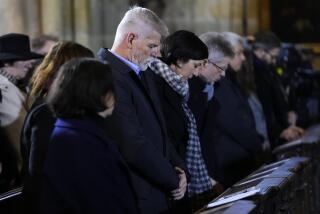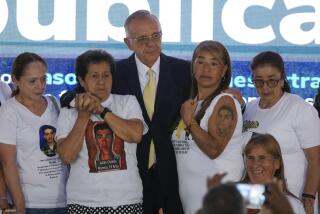An apology for Srebrenica
- Share via
It is Europe’s worst atrocity since World War II. About 8,000 Bosnian Muslims, most of them men and boys, were rounded up and systematically killed in the region of Srebrenica during Serbian President Slobodan Milosevic’s sweeping campaign to cleanse the Balkans of non-ethnic Serbs. At long last this week, the Serbian government issued an apology for the 1995 massacre in a hugely significant and politically difficult attempt to face that past.
President Boris Tadic is to be commended for pressing his countrymen to address the polarizing issue of what he called “that monstrous crime.” The resolution, initially presented by his coalition, “strongly condemns the crime committed against the Bosnian Muslim population of Srebrenica,” offers condolences and an apology to families of the victims, and acknowledges that “not everything was done to prevent the tragedy.” The resolution provoked vitriolic debate, with supporters and opponents accusing each other of being traitors, Nazis or patsies for the European Union, and was approved in parliament by just two votes.
The carnage at Srebrenica was carried out by Bosnian Serb troops under their commander, Ratko Mladic, who is still at large and has been indicted by the International Criminal Tribunal for the former Yugoslavia at The Hague on 16 counts, including genocide and crimes against humanity. He must be brought to justice if Serbia is to fully draw a line under this horrific chapter. But large segments of Serbian society do not accept responsibility for this war crime, and some don’t even acknowledge that the executions took place.
Critics decried the resolution as a cynical gesture driven by economics and calculated to satisfy the European Union, which demands that Serbia come clean on war crimes before it can join. The EU included Serbia in European visa and banking agreements following the 2008 arrest of former Serb leader Radovan Karadzic, who is now facing trial in The Hague on suspicion of masterminding the massacre in Srebrenica. Some Bosnian Muslim leaders and relatives of the victims say the declaration is too little, too late, particularly because it failed to recognize the war crime as genocide. The Hague tribunal has declared Srebrenica a genocide, the methodical killing of people “solely on the basis of their identity,” and the International Court of Justice also called the killings acts of genocide.
Still, we consider this a huge step forward, one that hopefully advances the process of reconciliation. In politics, the right thing often is done for the wrong reasons. More important is that the right thing gets done. It is never too late to address crimes of the past. This is a good and welcome start.
More to Read
Sign up for Essential California
The most important California stories and recommendations in your inbox every morning.
You may occasionally receive promotional content from the Los Angeles Times.










